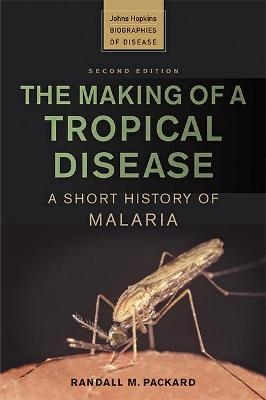
The Making of a Tropical Disease
A Short History of Malaria
Seiten
2021
|
second edition
Johns Hopkins University Press (Verlag)
978-1-4214-4179-5 (ISBN)
Johns Hopkins University Press (Verlag)
978-1-4214-4179-5 (ISBN)
A global history of malaria that traces the natural and social forces that have shaped its spread and made it deadly, while limiting efforts to eliminate it.
Malaria sickens hundreds of millions of people—and kills nearly a half a million—each year. Despite massive efforts to eradicate the disease, it remains a major public health problem in poorer tropical regions. But malaria has not always been concentrated in tropical areas. How did malaria disappear from other regions, and why does it persist in the tropics?
From Russia to Bengal to Palm Beach, Randall M. Packard's far-ranging narrative shows how the history of malaria has been driven by the interplay of social, biological, economic, and environmental forces. The shifting alignment of these forces has largely determined the social and geographical distribution of the disease, including its initial global expansion, its subsequent retreat to the tropics, and its current persistence. Packard argues that efforts to control and eliminate malaria have often ignored this reality, relying on the use of biotechnologies to fight the disease. Failure to address the forces driving malaria transmission have undermined past control efforts.
Describing major changes in both the epidemiology of malaria and efforts to control the disease, the revised edition of this acclaimed history, which was chosen as the 2008 End Malaria Awards Book of the Year in its original printing,
• examines recent efforts to eradicate malaria following massive increases in funding and political commitment;
• discusses the development of new malaria-fighting biotechnologies, including long-lasting insecticide-treated nets, rapid diagnostic tests, combination artemisinin therapies, and genetically modified mosquitoes;
• explores the efficacy of newly developed vaccines; and
• explains why eliminating malaria will also require addressing the social forces that drive the disease and building health infrastructures that can identify and treat the last cases of malaria.
Authoritative, fascinating, and eye-opening, this short history of malaria concludes with policy recommendations for improving control strategies and saving lives.
Malaria sickens hundreds of millions of people—and kills nearly a half a million—each year. Despite massive efforts to eradicate the disease, it remains a major public health problem in poorer tropical regions. But malaria has not always been concentrated in tropical areas. How did malaria disappear from other regions, and why does it persist in the tropics?
From Russia to Bengal to Palm Beach, Randall M. Packard's far-ranging narrative shows how the history of malaria has been driven by the interplay of social, biological, economic, and environmental forces. The shifting alignment of these forces has largely determined the social and geographical distribution of the disease, including its initial global expansion, its subsequent retreat to the tropics, and its current persistence. Packard argues that efforts to control and eliminate malaria have often ignored this reality, relying on the use of biotechnologies to fight the disease. Failure to address the forces driving malaria transmission have undermined past control efforts.
Describing major changes in both the epidemiology of malaria and efforts to control the disease, the revised edition of this acclaimed history, which was chosen as the 2008 End Malaria Awards Book of the Year in its original printing,
• examines recent efforts to eradicate malaria following massive increases in funding and political commitment;
• discusses the development of new malaria-fighting biotechnologies, including long-lasting insecticide-treated nets, rapid diagnostic tests, combination artemisinin therapies, and genetically modified mosquitoes;
• explores the efficacy of newly developed vaccines; and
• explains why eliminating malaria will also require addressing the social forces that drive the disease and building health infrastructures that can identify and treat the last cases of malaria.
Authoritative, fascinating, and eye-opening, this short history of malaria concludes with policy recommendations for improving control strategies and saving lives.
Randall M. Packard is a professor of the history of medicine at Johns Hopkins University. He is the author of White Plague, Black Labor: Tuberculosis and the Political Economy of Health and Disease in South Africa and A History of Global Health: Interventions into the Lives of other Peoples.
Foreword, by Charles E. Rosenberg
Preface: Mulanda
Introduction: Constructing a Global Narrative
1. Beginnings
2. Malaria Moves North
3. A Southern Disease
4. Tropical Development and Malaria
5. The Making of a Vector-Borne Disease
6. Malaria Dreams
7. Malaria Realities
8. Rolling Back Malaria
9. Malaria Eradication Redux
Conclusion: Ecology and Policy
Acknowledgments
Notes
Index
| Erscheinungsdatum | 14.07.2021 |
|---|---|
| Reihe/Serie | Johns Hopkins Biographies of Disease |
| Zusatzinfo | 2 Halftones, black and white; 19 Line drawings, black and white |
| Verlagsort | Baltimore, MD |
| Sprache | englisch |
| Maße | 152 x 229 mm |
| Gewicht | 499 g |
| Themenwelt | Studium ► Querschnittsbereiche ► Geschichte / Ethik der Medizin |
| Studium ► Querschnittsbereiche ► Prävention / Gesundheitsförderung | |
| Naturwissenschaften | |
| ISBN-10 | 1-4214-4179-9 / 1421441799 |
| ISBN-13 | 978-1-4214-4179-5 / 9781421441795 |
| Zustand | Neuware |
| Haben Sie eine Frage zum Produkt? |
Mehr entdecken
aus dem Bereich
aus dem Bereich
Die Geschichte eines Weltzentrums der Medizin von 1710 bis zur …
Buch | Softcover (2021)
Lehmanns Media (Verlag)
CHF 27,90
Krankheitslehren, Irrwege, Behandlungsformen
Buch | Softcover (2024)
C.H.Beck (Verlag)
CHF 55,90


